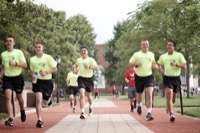Walking history of journalism
Renowned editor Gene Roberts discusses career with journalism students
10:25 a.m., Nov. 27, 2013--Addressing a packed Baptist church, the Rev. Dr. Martin Luther King Jr. spoke of basic human values, of loving thy neighbor, of not hating the person you were trying to change.
With crowds spilling onto the steps and no room to stand in the Durham, N.C., church, Gene Roberts, then a 28-year-old reporter assigned to cover King, spent the evening perched on the windowsill, “realizing, for the first time, that I was going to see massive racial change.”
People Stories
'Resilience Engineering'
Reviresco June run
His Pulitzer Prize-winning book, The Race Beat, chronicles that change.
Roberts — who served as managing editor of The New York Times and executive editor of the Philadelphia Inquirer during its “golden age” of 17 Pulitzer Prizes in 18 years, and is widely regarded as one of the most influential 20th century newspaper editors — recounted his experiences to nearly two dozen students enrolled in Introduction to Journalism, a course taught by veteran journalist and adjunct professor Mark Bowden.
Roberts spoke of “survival techniques” employed by journalists in the hostile South, such as wearing two half-sized reporters’ notebooks beneath their jackets to resemble shoulder holsters. “Mobs might attack a reporter,” he said, “but not the FBI.”
He recalled how a fellow journalist confronted a Ku Klux Klan leader after a particularly nasty rally. “If something happens to us,” his colleague warned, “you will not want to read the front page of the LA Times.” Within minutes, about a dozen Klansmen in a V-shaped formation came “clocking over in robes,” with Roberts and his friend shrouded in the middle.
He described King as “absolutely magical as a speaker,” as a man who changed history, but also as a man who ate loads of orange and banana popsicles in an effort to keep his weight down.
Students’ posed questions that spanned Roberts’ storied career:
What decisions did you make at the Inquirer to turn the paper around? (“To hire the very best.”)
Where should a young person looking to get into journalism look? (“Start out on a small paper… In a year or two, you get to cover everything, and they can’t bench you if you make a mistake.”)
How do you view the rapid change in journalism? (“Forlornly… There’s an illusion that with 24-hour stations, we’re getting more news.”)
Roberts cited the 2009 report by the Pew Research Center’s Project for Excellence in Journalism, which found newspapers with Washington bureaus declined by more than half from the mid-1980s to 2008.
“What voters don’t know, they can’t act upon,” he said. “We just don’t know what we’re missing — but it has to be substantial.”
When asked what’s the most important quality you look for in a journalist, Roberts told the story of his first editor, a blind man whose wife would read him the morning paper and whose gruff voice would beckon, “Roberts, come to my cubicle.” There, he would complain that Roberts hadn’t written vividly enough. “Make me see,” he would say.
“And that,” said Roberts, “is the essence of journalism. The kinds of journalist I look for, and react to, are the ones who can make me see.”
Article by Artika Rangan Casini








